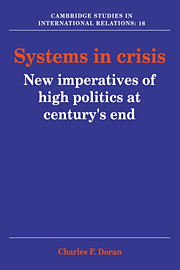Book contents
- Frontmatter
- Contents
- Preface
- Acknowledgments
- Introduction: new perspectives on the causes and management of systems crisis
- Part 1 Dynamics of state power and role: systems structure
- 1 What is power cycle theory? Introducing the main concepts
- 2 Measuring national capability and power
- 3 The cycle of state power and role
- Part 2 Dynamics of major war and systems transformation
- Part 3 Dynamics of general equilibrium and world order
- Part 4 Systems transformation and world order at century's end
- Appendix: Mathematical relations in the power cycle
- References
- Index
3 - The cycle of state power and role
Published online by Cambridge University Press: 08 September 2009
- Frontmatter
- Contents
- Preface
- Acknowledgments
- Introduction: new perspectives on the causes and management of systems crisis
- Part 1 Dynamics of state power and role: systems structure
- 1 What is power cycle theory? Introducing the main concepts
- 2 Measuring national capability and power
- 3 The cycle of state power and role
- Part 2 Dynamics of major war and systems transformation
- Part 3 Dynamics of general equilibrium and world order
- Part 4 Systems transformation and world order at century's end
- Appendix: Mathematical relations in the power cycle
- References
- Index
Summary
Over lengthy time periods, the power of a state relative to others follows a curve of rise and decline with unique properties, and of specific consequence for security and peace. The state cycle of power and role is the truest expression of relative change in the structure of the international system. It is the gist of that dynamic: changes on the state power cycles and changing systems structure are codeterminative. Without a comprehension of the full dynamic, as this chapter argues, the most significant aspect of systems structure – the bounds it places on international political opportunity and behavior – is obscured.
Intuitive recognition of the difference between absolute and relative power change, and of the importance of relative change for foreign policy conduct, permeates the assessments of statesmen about the future of their own statecraft, the speculations of diplomatic historians about the causes of war, and the analyses of scholars of international relations about the changing structure of the system. Yet, in these discussions, the concepts of absolute and relative are often juxtaposed and misconstrued when dealing with that which is most different about the two concepts, namely, the nature of their respective trajectories. Consequently, the foreign policy meaning is lost in contradiction. For an intuitive recognition of the difference between absolute and relative power change is insufficient to an understanding of the very peculiar nature of relative power itself.
- Type
- Chapter
- Information
- Systems in CrisisNew Imperatives of High Politics at Century's End, pp. 59 - 90Publisher: Cambridge University PressPrint publication year: 1991



